Home » Housing disputes » How to evict an illegally living person from an apartment
5
Often, a stranger who has temporarily moved into someone else’s living space does not want to leave after the expiration of the contract. Or another case - the apartment is occupied without permission, but there is no way to evict the illegal tenants peacefully. There can be many options, but they all have one thing in common: a person lives illegally, but does not intend to be evicted.
What to do in such cases? What steps should be taken in order, on the one hand, to get rid of unwanted tenants, and on the other hand, to avoid making mistakes and to act strictly according to the law?
Can the police or local police officer evict illegally residing citizens?
Neither the district police officer nor any other police representative has the right to evict anyone from the apartment, including citizens who are in the residential premises illegally.
But, if the owner of the apartment makes a corresponding statement or complaint against the illegal tenant, the district police officer can explain to the violator that his actions are illegal and if they continue, the citizen may be evicted by court, and other unpleasant consequences may also occur.
Usually in such cases, the police invite the offender to move out and warn that they will closely monitor the situation until its final resolution. Most often, such a preventive conversation is enough for the uninvited guest to leave someone else's living space.
In order for the police to intervene in an unpleasant situation, the owner of the property must submit an official statement describing how the citizen moved into the residential premises, what the owner did to evict the illegal tenant and how the offender responded to the actions of the apartment owner.
Sample application to the district commissioner
Court decisions
How to peacefully resolve housing issues
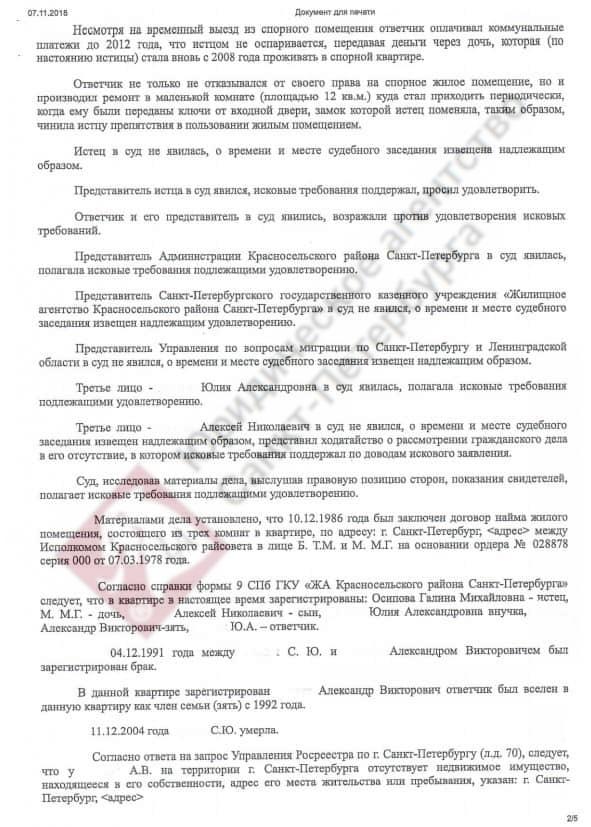
Apartment disputes: eviction of a family member
On your own rake: what nuances should not be forgotten when it comes to the housing issue
My housing: what to do if they try to kick you out of your apartment
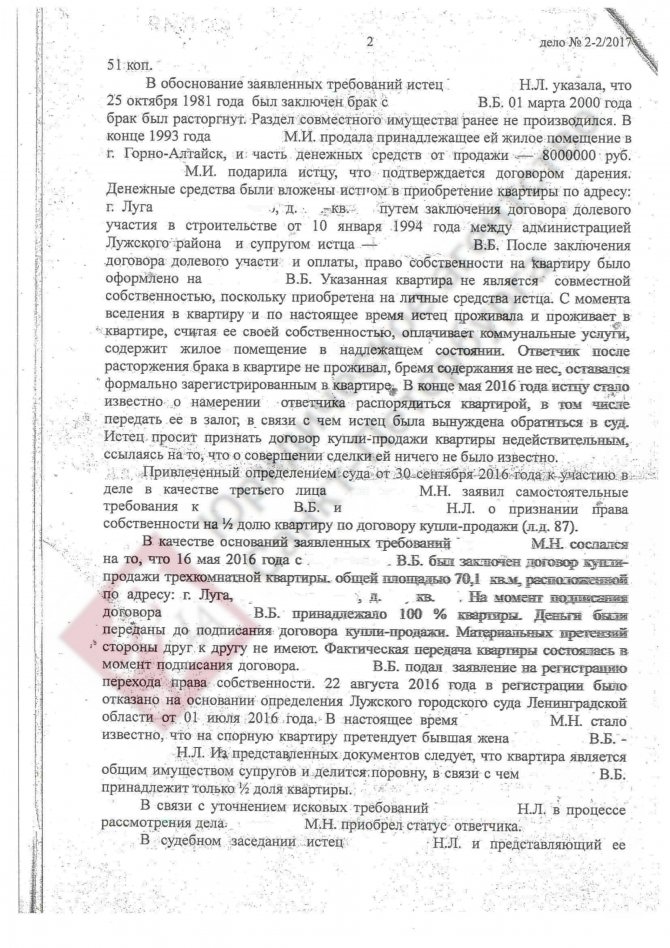
How to protect property rights after divorce
Dispute with a housing construction cooperative
The procedure for eviction of illegally residing citizens from residential premises
In cases where a citizen illegally living in a residential building refuses to leave it voluntarily, the owner of the apartment or house has to turn to any government agency for help: the police, the prosecutor's office, the court.
The wrong step would be to try to evict the offender yourself using some forceful methods or even use physical force against them. In this case, it is very easy to suffer yourself or, on the contrary, to find yourself breaking the law.
Of course, the process of eviction by legal means does not always happen as quickly as we would like; it requires patience and some preliminary preparation.
First, it is necessary to clarify whether a citizen is actually living in a residential building illegally; if he claims that he has legal grounds to be in the apartment, he must have documents confirming these grounds, namely:
- move-in warrant;
- contract of sale;
- document on privatization of residential premises;
- social tenancy or rental agreement;
- deed of gift for an apartment;
- document on entry into inheritance;
- any other document that can confirm the legality of being in this residential premises.
If a citizen does not have any of the above documents, he is subject to eviction as an illegal resident of the apartment.
There are several ways to get rid of the intruder and evict him from the residential premises he occupies.
Contacting the police
The first of them is to apply to the local police officer. This is especially true if illegal tenants not only do not want to move out, but are also rude, make threats, use physical force, and damage the property of the owner of the premises.
In this case, a criminal article may be applied to them, which will depend on the severity of the consequences of the guest’s illegal actions.
If the tenant does not threaten the owner or damage his property, then it is advisable to try to solve the problem peacefully and try to understand the motives of the illegal resident. It is quite possible that he simply does not know that he has lost the legal right to be on your square meters or that we are already looking for a new place of residence, but did not have time to notify about it.
In this case, you can try to find some kind of compromise, wait a while until the tenant solves his problems.
It was not possible to reach an agreement and solve the problem peacefully. What to do in such cases?
Procedure and procedure
It is advisable to first talk with the local police officer, describe the whole problem to him, most likely he will invite you to write a statement of complaint about the intractable guest. After accepting the application, the district police officer will begin to directly perform his duties and take the following steps:
- Will visit a residential premises where an illegal occupant is located.
- He will check his documents and find out on what basis the citizen is in this place.
- Interview neighbors and other witnesses.
- Based on the results of visiting the disputed residential premises and after clarifying all the circumstances, a protocol will be drawn up.
- Information from the protocol will be conveyed to the illegal tenant, adding to it a warning about the necessary eviction, indicating the period by which the offender must leave the apartment.
If, after the deadline for eviction, the residential premises are not vacated by the illegal tenant, the owner may file a claim for eviction in court.
Example of eviction by police
Former spouses Nina and Konstantin L live in a two-room apartment. The woman is the owner of the living space, the husband moved into the apartment after marriage and has no rights to housing. After the divorce, the wife repeatedly reminded her ex-husband to leave the living quarters, but her reminders did not have the desired effect. Tired of waiting, the woman sent the offender a registered letter notifying her of the requirement to leave the apartment within a month, but her ex-husband ignored this requirement too.
Nina L. Filed a complaint with the district police officer. The policeman visited the disputed residential premises and explained to the offender that he had no right to live in the apartment after the divorce and pointed out the consequences that could occur if Konstantin did not move out of the apartment.
The man asked his ex-wife for a month to solve his housing problems and, after finding a rented apartment, left the premises.
Application to the prosecutor's office
In a number of controversial situations, the owner can evict an illegal tenant administratively, with the help of the prosecutor's office. Administrative eviction occurs quite rarely, and only in cases where:
- the residential premises are occupied by the guest without permission;
- there is a threat to the life or health of other citizens;
- the building where the apartment is located is in disrepair and there is an immediate threat to the life and health of the citizens in it;
- the tenant moved into the apartment using threats or physical force against the owner of the premises.
It must be borne in mind that a person evicted in this way can appeal the prosecutor’s decision on administrative eviction in court.
Let's look at the cases in which administrative eviction can be used, using the example
Citizen K. decided to move in with his children for the whole winter. Since he was leaving for a long time, just in case, he gave duplicate keys to his neighbor on the landing. The same woman, in turn, handed over the keys to citizen K.’s apartment to her nephew, who wanted to live separately from his parents and was looking for rented housing.
Six months later, the owner returned home and found a stranger in the apartment, who, moreover, behaved aggressively, refused to move out and began to threaten the elderly man. The owner of the apartment filed a complaint with the prosecutor's office about illegal occupancy; he attached to the statement the title documents for the residential premises and an extract from the apartment register.
The prosecutor, after studying the circumstances of the illegal stay in the residential premises, issued a sanction to evict the unauthorized occupant from the apartment.
Lawsuit
The third method of eviction, through the courts, can be called the most time-consuming. In this case, the eviction procedure can last for many months, but in cases where it is impossible to evict the illegal tenant in any other way, it is necessary to resort to eviction through the court.
Procedure and procedure
Before filing a claim for eviction in court, it is necessary to comply with the pre-trial procedure, otherwise the court may not accept the claim.
First of all, you must personally ask the offender to leave the premises voluntarily. If he has ignored your request, send him a telegram or a letter notifying him of the need to leave the apartment he illegally occupied and indicate the deadline by which this must be done.
If this requirement is ignored, then the next step should be to file a complaint with the police. If this does not have any result, then the police report will become one of the evidence in the court hearing.
The plaintiffs in an eviction case may be:
- the owner of the residential premises, both an individual and any subject of the Russian Federation who owns the disputed apartment;
- a citizen (or group of citizens) living in residential premises under a social tenancy agreement, on any other legal basis;
- third parties whose interests are affected by a citizen residing illegally;
- prosecutor's office
So, briefly about what needs to be done and in what order to evict an illegal resident:
- Verbally notify the offender to leave the premises.
- Give notice in writing (notice or demand to vacate).
- Visit the police and file a report about the illegal occupant.
Having received a refusal or not receiving any response to the first three actions, the owner can go to court.
It is necessary to remember the jurisdiction; the statement of claim is submitted to the court of the district where the disputed residential premises are located.
To go to court you must:
- Draw up a statement of claim for the eviction of an illegal resident.
- Collect the necessary package of documents.
- Pay the state fee (for a non-property claim it is 300 rubles).
- Submit the entire package of documents to the court by visiting the court office in person or sending the claim by registered mail.
- Take part in the court hearing (in person or by sending a legal representative there).
- Get a court decision.
- Evict the offender. In this case, the presence of a local police officer or bailiffs is necessary.
In the trial, the plaintiff will need to prove, firstly, that he is the owner of the disputed residential premises or a responsible tenant, and secondly, that the defendant is living in the residential premises illegally.
Only after establishing these two facts will the court make a final decision - to evict the defendant from the premises or to leave everything as it is. The court may also grant the defendant a deferment while he searches for other housing.
Eviction process
Eviction is the voluntary or forced release of residential premises from citizens who illegally occupy it, as well as from their property in any form (furniture, personal belongings, pets, etc.).
No one except bailiffs has the right to carry out evictions, especially forced ones. Moreover, the owner himself should not deal with this, since you can easily find yourself in such a situation either as a victim, but in another case (if the offender applies any physical force to you), or as an accused (if you apply it yourself, especially if your opponent’s personal property is damaged or you harm his health).
Eviction by court is possible only after the court decision has entered into legal force.
If the illegal tenant refuses to leave the housing after the decision of the judicial authorities, then the plaintiff must contact the SSP. Having received a writ of execution and an application from the owner of the residential premises, the bailiff initiates enforcement proceedings and acts within the framework of enforcement proceedings.
In especially difficult and difficult situations, when illegal occupants show serious resistance to the SSP officers, police officers and the Ministry of Emergency Situations may be involved to enforce the court decision.
Example of eviction through court
Citizen Kuznetsova allowed a relative of her friends from another city to stay in the apartment. The rental agreement was signed for six months. But neither six months nor a year later the tenant moved out of the apartment; moreover, he moved his partner in with him. They ignored all the owner’s demands, insulted her, and threatened her with violence. They also refused a written request to move out. A visit to the local police officer also had no effect.
Gr. Kuznetsova was forced to file a claim in court. At the trial, she stated that she no longer wanted to tolerate strangers in her apartment, especially since they behaved inappropriately. The defendant long ago lost the right to live in the apartment. The defendant’s cohabitant moved into the residential premises without permission, without the knowledge or consent of the plaintiff.
The court, having considered all the materials of the case, decided to evict the defendant and his cohabitant from the living quarters.
Customer Reviews
Gratitude from Piskunov I.B. I just don’t have words to express my gratitude to Sergei Vyacheslavovich. Thank you for having such a lawyer. Thank you for your help regarding the issue regarding the employment contract.
Piskunov I.B. 12/12/2018
Gratitude from Soboleva E.P. I would like to express my deep gratitude to Vasily Anatolyevich Kavaliauskas for his literacy, consultation and attention to the client who found herself in a difficult situation; as well as wonderful, sensitive administrators. I wish the company prosperity and good clients.
Sincerely, Soboleva Elena Petrovna. September 19, 2018
Gratitude from Guryanova T.A. I express my sincere gratitude to Vasily Anatolyevich for his professionalism and highly qualified assistance in resolving the issue of protecting my rights as a consumer. As a result, I received decent compensation from.
Thanks a lot. 07/09/2019
Gratitude to Sukhovarov I, Dmitry Vladimirovich Korchagin, express my gratitude and appreciation to lawyer Yuri Vladimirovich Sukhovarov for high-quality and qualified advice. Thank you.
Gratitude from Evgeniy N. I express my gratitude to Alexander Viktorovich Pavlyuchenko for the qualified management of my case, competent advice and informed decisions, which led to compensation for all claimed losses.
Sincerely, Evgeniy N., November 17, 2017
Review by B.I. Goreky Gratitude to Yuri Vladimirovich from B.I. Goreky for the consultation on family rights.
Gratitude from Plisetsky V.V. I would like to express my gratitude to Sergei Vyacheslavovich Mavrichev for his sensitive attitude and understanding towards clients. The issue was resolved within one day. I am very grateful to Sergei Vyacheslavovich.
Plisetsky V.V. October 19, 2018
Gratitude to Kavalyauskas V.A. from Astafieva A.S. I express my gratitude to the Legal Agency and in particular to lawyer Vasily Anatolyevich Kavaliauskas for the skillfully done work. Vasily Anatolyevich advised and prepared all the documents necessary for court proceedings. As a result of the consideration of the consumer rights case, the result and the high amount exceeded all my expectations. Thank you very much for your qualified work and professionalism.
Sincerely, Astafieva A.S., 03/01/2019
Thanks to Kavaliauskas V.A. I would like to express my deep gratitude to Vasily Anatolyevich, an employee of your company, for his enormous support and competent defense of my case. And also for having a good attitude towards people. I will recommend your organization to all my friends and family.
I wish you success and prosperity,
05/14/2018
Gratitude from gr. Tiuntsova G. A. I asked for advice from your “Legal Agency of St. Petersburg” - regarding deception by one person who presented himself as an employee of Rospotrebnadzor of the Krasnoselsky district, Novichkov A. A. Offered me a service - before the New Year, go on a tourist trade union voucher to Moscow on the Sapsan railway transport. I refused due to the manipulation of the placement of seats - in different trains, and then by car. Lawyer Sergei Vyacheslavovich Mavrichev handled this case and provided consultations. I thank you for such a sensitive and attentive attitude in office work, which was denied at the 58th police department of the Vyborg district, under Art. 24, 144, 145 of the Code of Criminal Procedure of the Russian Federation, I now have the right to appeal the conclusion and will send an application for further investigation to the district prosecutor's office.
Tiuntsov G. A.
8
Application to the police about the eviction of illegal residents (sample)
Sample application to the police to evict an illegal resident
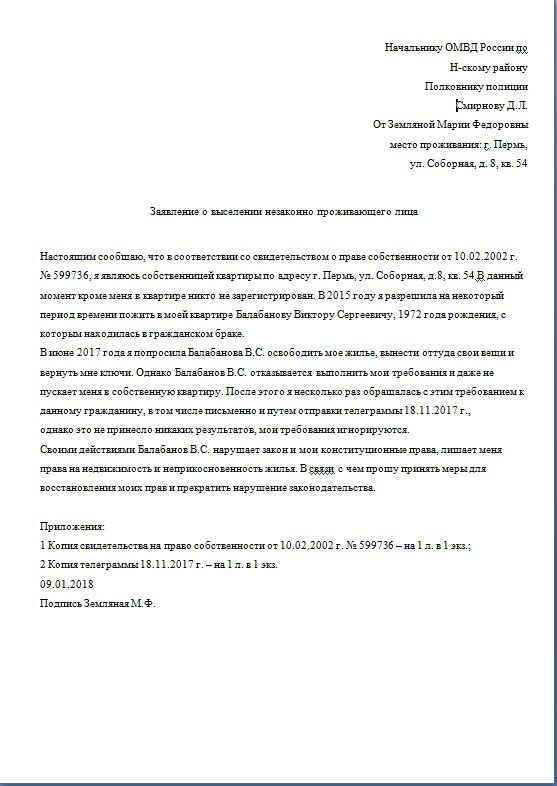
If the owner of the apartment knows the details of the district police officer, it is better to address the application to him, but if you do not know who he is, the document is written in the name of the head of the district police department. The application is written in free form, but it must indicate:
- personal data of the owner of the residential premises;
- describe the situation: who, when and how illegally occupied the apartment, what measures you took to evict them;
- please take measures to ensure that violators leave illegally occupied housing.
Copies are attached to the document:
- any title document;
- eviction requests;
- other documents that can help in the current situation.
Statement of claim for eviction of illegal residents (sample)
Sample statement of claim for eviction from an apartment
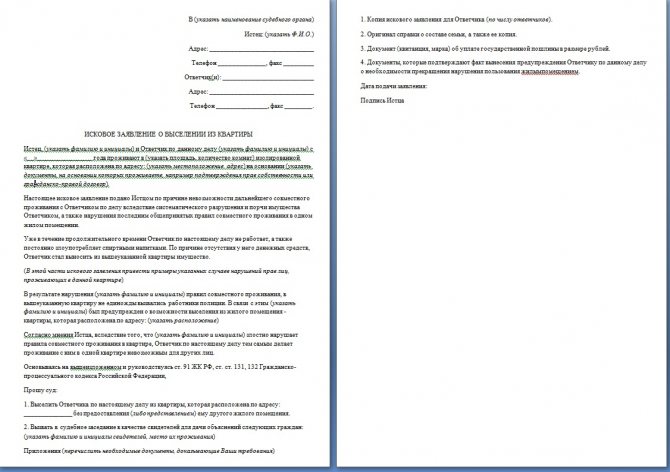
The statement of claim must include the following information:
- the name of the court in which the claim is filed;
- personal information about the plaintiff;
- the address from which the offender must be evicted;
- title documents for the apartment;
- description of the event of illegal entry, the essence of the claim;
- substantiation of claims;
- the requirements themselves;
- date and signature.
When drawing up a statement of claim, it is necessary to strictly adhere to the structure of the document.
Part 1 . This is the introductory part or the so-called “header”. Here are the following:
- name and address of the judicial authority to which the claim is filed (at the location of the disputed residential premises);
- personal data of the individual or name of the legal entity who is the plaintiff in the case;
- address (legal or place of residence) where the plaintiff is located;
- personal data of the defendant, his registration address, as well as his stay or actual location.
Part 2. Descriptive part, in which the plaintiff must state (briefly but logically):
- the events and circumstances under which the illegal entry occurred, voice all documents confirming its illegality;
- evidence of the plaintiff’s attempts to resolve the dispute out of court.
Part 3 . This part is motivational, that is, the plaintiff analyzes the circumstances of the case in it, refers to the legislation, and also briefly summarizes who violated the legal norms.
Part 4 . The operative part, in which the plaintiff must clearly state his claims against the defendant and voice his demands to the court.
List of documents that must be attached to the statement of claim:
- A copy of the statement of claim for the defendant.
- Statement to the district police officer about the need to conduct an inspection.
- Protocol on the verification of the legality of residence of the defendant, drawn up by the district police officer.
- Title documents for residential premises.
- Receipt for payment of state duty.
In addition to the standard package of documents, the following may be attached to the claim:
- Any evidence of illegal residence in the apartment (photo, video, audio materials).
- Written testimony from neighbors (at the meeting, witnesses will have to personally confirm their testimony).
- Utility bills (can serve as proof that someone lives in the premises).
- If a former spouse who is not the owner or co-owner of the apartment is evicted, then a certificate of divorce must be added to the package of documents.
When filing a claim, the applicant must take into account that the court will make a decision only after studying all the documents and other evidence in the case, assessing their design and content.
If any document has significant design comments or shortcomings, for example, an unreadable seal or a certificate not in proper form, then the court may not accept such a document as evidence, or may return it for re-issue.
The court will offer a deadline established by law to eliminate all shortcomings; if the plaintiff does not manage to meet this deadline, the court may refuse to consider the claim.
But after eliminating all the shortcomings and comments, the plaintiff can re-apply to the court with the same claim.
To summarize the above:
- an unauthorized occupied apartment or house must be abandoned by the illegal occupant;
- the owner of the residential premises has the right to evict an illegal guest in one of three legal ways: involve the police, contact the prosecutor's office or demand the exercise of his legal rights through the court;
- Only a court can forcibly evict a person from a residential premises; in some cases, the prosecutor’s office also has such powers;
- The owner himself should not try to forcibly evict an illegal tenant; this is fraught with criminal prosecution for the owner of the disputed apartment.
FREE CONSULTATIONS are available for you! If you want to solve exactly your problem, then
:
- describe your situation to a lawyer in an online chat;
- write a question in the form below;
- call Moscow and Moscow region
- call St. Petersburg and region
Save or share the link on social networks
Author of the article
Natalya Fomicheva
Website expert lawyer. 10 years of experience. Inheritance matters. Family disputes. Housing and land law.
Ask a question Author's rating
Articles written
513
- FREE for a lawyer!
Write your question, our lawyer will prepare an answer for FREE and call you back in 5 minutes.
By submitting data you agree to the Consent to PD processing, PD Processing Policy and User Agreement
Useful information on the topic

2
How to evict your roommate from your apartment
Neither legal nor civil marriages provide guarantees of long and...
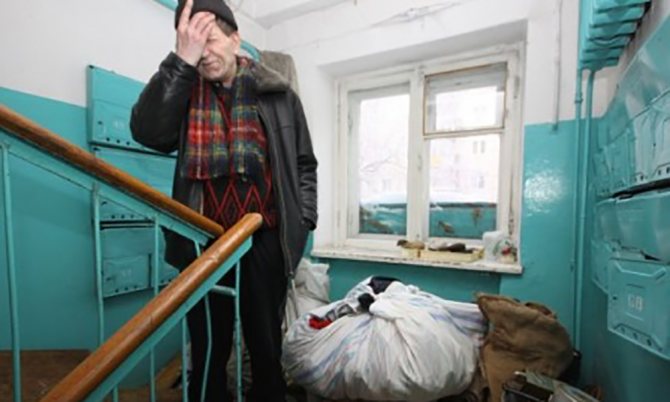
3
Is it possible to evict tenants in winter?
Renting out an empty apartment is quite a profitable business, especially...

1
Privatization of land under an apartment building
You can privatize not only a separate residential building, apartment or land...

Privatization of an apartment with debts on utility bills
Debts often become the main reason for refusing privatization, thereby...

4
How much does it cost to privatize an apartment?
Privatization of an apartment is a free procedure, but only within the cost...

Demolition of privatized housing
Any housing, including privatized, under certain conditions...







